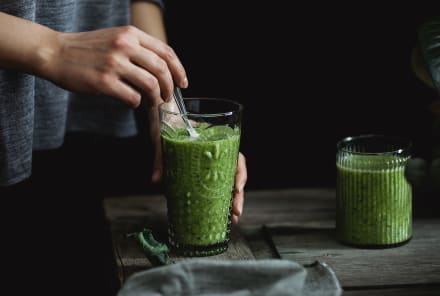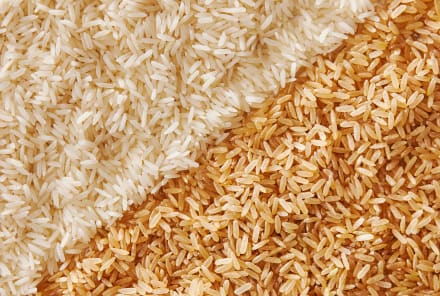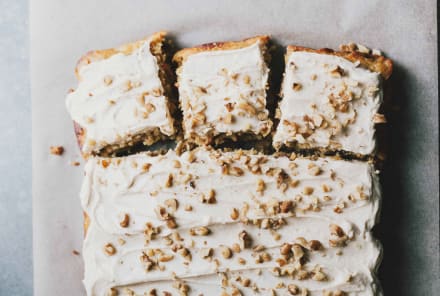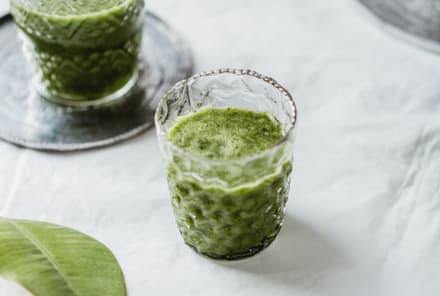Advertisement
Are Cashews Good For You? Benefits & How They Compare To Other Nuts


Cashews may not be the go-to snack at baseball games or carnivals (hi, peanuts and almonds), but the nuts are a fan-favorite for everyday munching.
We know they offer a delicious flavor and enjoyable crunch, but are cashews good for you? To find out, we asked registered dietitians to break down the nut's nutritional profile and investigated the latest research on its health benefits.
What are cashews?
Cashews are a type of nut grown on the Anacardium occidentale tree, and they're produced primarily in India, Vietnam, Mozambique, and Brazil, the latter of which they're native to1, says Maggie Moon, M.S., R.D., a Los Angeles–based registered dietitian and the author of The MIND Diet.
Surprisingly, cashews aren't actually a "true" nut: They're shell-covered edible kernels that grow off the tree's pear-shaped fruits, known as cashew apples, according to the University of Florida. (But for the sake of simplicity, we'll refer to them as nuts from now on.)
Cashew trees are susceptible to damage from pests, fungi, and disease, so farmers may apply herbicides, insecticides, and fungicides to protect the crops, as is the case in Côte d'Ivoire, a leading cashew producer. The tree thrives in frost-free tropical climates, so you won't see cashews grown commercially in the U.S.
Shaped like a kidney and light beige in color, cashews have a mild nutty flavor, satisfying initial crunch, and creamy texture that makes them ideal for snacking. They're commonly used to add a thick, velvety texture to vegan dishes, such as soups and dips, as well as a crunch to salads and trail mixes.
The shell of a cashew nut contains urushiol, a poisonous, oily liquid that can cause blisters on the skin. In turn, all cashews sold in grocery stores will be shelled and processed (either roasting, steaming, etc.) to remove the oil.
Like many nut varieties, cashews can be pricey, ranging from $13 to $17 for about 2 pounds.
In 2017, cashews were the second most popular tree nut in the U.S., with sales growing 7% each year. However, cashews are a common allergen, and some studies suggest cashew allergies are becoming more common as consumption increases.
Summary
Nutritional information
Here's the nutritional breakdown of 1 ounce (about a handful) of raw cashew nuts, according to the USDA2:
- Calories: 157
- Protein: 5.16 grams
- Fat: 12.4 grams
- Saturated fat: 2.21 grams
- Monounsaturated fat: 6.75 grams
- Polyunsaturated fat: 2.22 grams
- Carbohydrates: 8.56 grams
- Dietary fiber: 0.94 gram
- Sugar: 1.68 grams
- Potassium: 187 milligrams
- Copper: 0.62 milligram
- Magnesium: 82.8 milligrams
- Iron: 1.89 milligrams
As with many nut varieties, cashews are a great source of unsaturated fats, the type of fat that can help lower3 low-density lipoprotein (aka LDL or "bad") cholesterol and increase4 high-density lipoprotein (aka HDL or "good") cholesterol when eaten in place of saturated fat, says May Zhu, MBA, R.D., LDN, a registered dietitian in Chicago.
Plus, cashews offer protein, a macronutrient that can help increase satiety, she notes. "It's a really great food to incorporate to help you stay fuller for a little bit longer," she says. "They're also low in sugar, so they're great for most diets."
Cashews' standout feature, however, is their micronutrient composition. The nuts are rich in copper, a mineral required for energy production and brain health5, and magnesium, which supports muscle and nerve function6, says Zhu. They also provide iron, a mineral that's needed to carry oxygen7 throughout your body.
Nuts in general are energy-dense foods, meaning they offer more calories per serving than other foods, such as fruits and veggies, says Zhu. "All nuts fit within the 150- to 200-calorie range per serving, and cashews are right in the middle, if not the lower end, of that," adds Moon.
Though they're higher in calories compared to other foods, nutrient-rich cashews and other nuts can be a healthy addition to your diet when consumed in moderation, says Zhu.
Cashew benefits:
They may support cardiovascular health when consumed in moderation.
There's a good chance the question "Are cashews good for your heart?" is at the top of your mind. And there's good news: The nuts can support cardiovascular health.
Research on cashews, specifically, supports the nuts' heart-health benefits. In an eight-week study of 50 individuals with Type 2 diabetes, researchers found that consuming cashews (equating to 10% of total daily calorie intake) significantly decreased serum insulin levels8 and improved the ratio of LDL to HDL cholesterol.
Another 2017 study9 on 51 adults with or at risk of high LDL cholesterol had similar results; the researchers found that consuming cashews daily for 28 days decreased total cholesterol and LDL cholesterol levels. In the takeaway of the research, the study authors note that eating cashews daily in place of high-carbohydrate snacks can help manage cholesterol.
They contain an essential nutrient for your brain health.
Munch on a 1-ounce serving of cashews, and you'll fulfill 69% of the recommended dietary allowance for copper, according to the National Institutes of Health5 (NIH). The mineral plays a key role in energy production, iron metabolism, and the synthesis of connective tissue and neurotransmitters.
Plus, copper supports brain health, says Moon. "Without copper, the myelin sheath—aka white matter—isn't able to form correctly," she explains. In case you don't know, the myelin sheath is a layer of insulation that forms around nerves. It helps quickly transfer information via electrical impulses between brain cells, says Moon. "When white matter weakens, the messages to and from our 100 billion nerve cells, which affect every aspect of how we function, slow down and break down," she adds.
Research published in Frontiers in Aging Neuroscience suggests that having low serum copper levels is associated with cognitive decline in older adults10. And a 2019 study found that older adults who consume a moderate amount of nuts (read: 15 to 30 grams) daily have higher cognitive scores11 than those who don't eat nuts.
They contain beneficial antioxidants.
Along with the vitamins and minerals listed on a nutrition facts label, cashews boast antioxidants—plant compounds that work to neutralize free radicals, highly unstable molecules that trigger oxidative stress and may contribute to cardiovascular disease and cancer12 development, says Zhu.
Specifically, cashews contain flavonoids, says Moon. These compounds have been found13 to have anti-inflammatory effects on chronic conditions such as autoimmune diseases, cancer, diabetes, cardiovascular disorders, and neurodegenerative diseases. In fact, studies have shown14 that folks who consume a large number of flavonoids have an 18% lower mortality risk of cardiovascular disease than those who don't.
They offer plant-based protein.
Research shows15 that consuming plant-based protein is inversely associated with all-cause mortality, and replacing just 3% of protein intake with plant-based sources has been linked16 with a 10% reduction in overall mortality.
Unlike animal-derived proteins, the protein in cashews is not considered a "complete" protein, meaning it doesn't provide enough of15 all nine essential amino acids that you need to obtain from food, says Moon. However, "[consuming] a variety of plant foods throughout the day will be adequate to provide all the amino acids that you need for human health," she notes.
They contain an essential mineral for cognitive function and healthy pregnancies.
In a serving of cashews, you'll nab 1.89 milligrams of iron, equating to 10.5% of the RDA17. This mineral is primarily used to create hemoglobin, the proteins in red blood cells that carry oxygen throughout your body and to your muscles. When you're deficient in iron, you may experience GI disturbances, weakness, fatigue, and difficulty concentrating7.
Your cognitive function can also become impaired. Frontiers in Aging Neuroscience found a significant association between low copper levels and worse performance on a cognition exam10 in participants who also had low iron levels.
Though consuming enough iron is essential for everyone, it's also particularly important for pregnant individuals, as low intakes have been associated with low birth weight, premature birth, and impaired cognitive and behavioral development in infants7. Specifically, iron deficiency during the first trimester may negatively18 impact fetal growth and increase the risk of premature labor.
Allergies and side effects
While cashews are good for you in most cases, there are a few considerations to keep in mind. Cashews are a common allergen, and folks who experience allergic reactions to them may react poorly to other tree nuts, too.
A small 2018 study19, for instance, found that two-thirds of people who are allergic to cashews also react to pistachios. When an allergic person is exposed to cashews, proteins in the nut bond to IgE antibodies created by the immune system, which then triggers a reaction.
Cashews and other nuts also contain phytic acid, a compound that binds to minerals20, such as iron, magnesium, and zinc and may reduce their bioavailability (read: your body's ability to absorb the nutrients), says Zhu.
That said, research investigating the extent of this effect has so far been inconclusive, as individual metabolism and preparation methods can impact phytic acid's binding effect, she adds. Some experts say soaking nuts prior to consumption can reduce phytic acid content, but recent research21 found that doing so didn't result in greater nutrient bioavailability.
Cashews vs. other nuts
While all nuts offer plant-based protein and unsaturated fats, their exact nutritional offerings—plus flavor profiles and costs—vary slightly.
Cashews vs. Peanuts:
Per 1-ounce serving, peanuts provide22 a bit more protein (7 grams) and unsaturated fat (11 grams) than cashews. The nuts, which are technically23 the seeds of legumes, are typically roasted24, giving them a uniquely nutty and somewhat sweet flavor.
Peanuts cost less than $7 for 2 pounds, making them more affordable than cashews.
Cashews vs. Almonds:
The nuts provide more than 7 milligrams of the antioxidant, which is known for its skin-soothing abilities, she adds. Almonds' flavor can range from sweet to bitter26. A roughly 2-pound bag of the nuts can cost $9, so they're a bit more budget-friendly than cashews.
Cashews vs. Walnuts:
Cashews and almonds are comparable in terms of price; a 2-pound bag of walnuts can run you about $13.
Raw vs. roasted cashews
Although you'll find cashews labeled "raw" in grocery stores, they've still been processed—the shell removed, the nut steamed—to remove the urushiol compound, says Zhu. "Since they're free of any added preservatives, they can still be labeled as raw," she notes. Due to this process, urushiol isn't a concern unless you're attempting to shell and eat a cashew nut grown in your own backyard, she adds.
The nutrient profile of raw vs. roasted cashews is fairly similar. Cooking may "kill off" some vitamin C and B vitamins, but it can also increase the content of some minerals, such as potassium, magnesium, and calcium, says Moon.
Similarly, a 2011 study found that roasting cashews enhanced the nuts' antioxidant activity28, but the research is dated, and the increase in activity may be insignificant for health improvements, says Zhu.
Summary
Cashew butter
Aside from their whole nut form, cashews are now being blended into butter, just like peanuts and almonds. These spreads will generally have similar nutrition profiles to the raw nuts, featuring plenty of healthy unsaturated fat and protein in a 2-tablespoon serving, says Zhu.
However, ingredients such as safflower oil, sunflower oil, salt, and sugar may be mixed in. Depending on the specific type of oil added, the cashew butter's content of saturated fat may increase, which can raise LDL cholesterol and increase the risk of heart disease.
In the same size serving, cashew butter may also have a higher number of calories than whole cashews, says Moon. "Any time you process a food, you're outsourcing some of the work that your body might have done to digest that food," she explains. "Cashew butter and cashew milk will have more of their calories available because they've been broken down a little bit for you."
Summary
Cashew recipes
Compared to other tree nuts, cashews are the most versatile variety, says Zhu. Thanks to their high fat content, they help create a creamy consistency in sauces, dips, and soups while keeping recipes dairy-free, she says. Instead of whisking milk or cream into your pasta sauce, for instance, try adding puréed cashews or cashew milk into your pot instead, she suggests.
For the same reason, cashews are ideal for vegan cooking, says Moon. Blend them up and use them to make homemade, plant-based sour cream, ice cream, queso, or creamy smoothies, she suggests.
To capitalize on cashews' crunch factor, sprinkle the chopped nuts on salads for a garnish, mix them into stir-fries and rice dishes, or incorporate them into a satisfying trail mix, the experts recommend. Of course, you can also just eat them plain!
When in doubt, try these cashew-centric recipes:
Buying & storage tips
When buying cashews, your first step should be to look at the ingredient list. Watch out for added oils, salts, or sugars, then consider how those ingredients fit into your overall diet. These additives aren't always a reason to put the product back on the shelf, so long as you're consuming them in moderation, but the first ingredient should always be cashews, says Zhu.
The nuts themselves should be a bright, creamy white color, free from any mold and spots, and plump (not shriveled), the experts advise.
Herbicides and insecticides may be applied to cashew trees, so consider shopping for certified organic cashews; with organic crops, pests, weeds, and diseases will be managed via mechanical and biological methods rather than synthetic options.
Since cashews are high in fat, they're capable of going rancid quicker than other pantry staples. To slow down the process, try storing the nuts in an airtight container in the fridge, where they'll last for about six months, or in the freezer, where they'll stay fresh for up to a year, Zhu says.
"You can also store them at room temperature, but the key is to put them in an airtight container in a cool, dark area," she notes. "Any kind of sun exposure or heat can speed up the rate at which they spoil."
Summary
FAQ
How many cashews should you eat a day?
There's no set recommendation of how many cashews to eat daily. However, "having one serving two or three times per week is probably enough to provide sufficient health benefits," adds Zhu. "Other times, you can rotate in other nuts and seeds to get the most out of their micronutrient profiles." As a reminder, one serving of cashews is usually 1 ounce, a quarter-cup, or roughly 18 nuts, says Moon.
Are cashews good for your heart?
Thanks to their high unsaturated fat content, cashews can support heart health. Studies have suggested that consuming cashews can help manage cholesterol.
Are cashews fattening?
Although cashews are energy dense, there are not any high-quality clinical trials showing that eating nuts leads to weight gain, says Moon. "It's a little bit oversimplifying to say that you want to limit cashews because of their high-energy offerings," she notes. One meta-analysis of six clinical trials found that consuming cashews had no significant effect on body composition and weight. If you eat them as part of a balanced diet, you shouldn't have a problem.
The takeaway
So, are cashews good for you? In short, yes. Rich in unsaturated fats, essential minerals, antioxidants, and plant-based protein, cashews can support heart and brain health, keep inflammation in check, and help you feel full and satisfied. Cashews are typically best consumed in moderation due to their high energy density.
28 Sources
- https://www.ncbi.nlm.nih.gov/pmc/articles/PMC6952502/
- https://fdc.nal.usda.gov/fdc-app.html#/food-details/170162/nutrients
- https://pubmed.ncbi.nlm.nih.gov/30094038/
- https://www.ncbi.nlm.nih.gov/pmc/articles/PMC6483656/
- https://ods.od.nih.gov/factsheets/Copper-HealthProfessional/
- https://ods.od.nih.gov/factsheets/Magnesium-HealthProfessional/
- https://ods.od.nih.gov/factsheets/Iron-Consumer/
- https://www.ncbi.nlm.nih.gov/pmc/articles/PMC6408729/
- https://pubmed.ncbi.nlm.nih.gov/28356271/
- https://www.frontiersin.org/articles/10.3389/fnagi.2022.811117/full
- https://pubmed.ncbi.nlm.nih.gov/30697633/
- https://ods.od.nih.gov/factsheets/VitaminE-HealthProfessional/
- https://www.ncbi.nlm.nih.gov/pmc/articles/PMC6407021/
- https://www.ncbi.nlm.nih.gov/pmc/articles/PMC7697716/
- https://www.ncbi.nlm.nih.gov/pmc/articles/PMC6893534/
- https://www.ncbi.nlm.nih.gov/pmc/articles/PMC7358979/
- https://ods.od.nih.gov/factsheets/Iron-HealthProfessional/
- https://www.ncbi.nlm.nih.gov/pmc/articles/PMC4375689/
- https://pubmed.ncbi.nlm.nih.gov/29127694/
- https://www.ncbi.nlm.nih.gov/pmc/articles/PMC4325021/
- https://pubmed.ncbi.nlm.nih.gov/32199146/
- https://fdc.nal.usda.gov/fdc-app.html#/food-details/172430/nutrients
- https://www.ncbi.nlm.nih.gov/pmc/articles/PMC4711439/
- https://www.sciencedirect.com/science/article/abs/pii/B9781630670382000113
- https://fdc.nal.usda.gov/fdc-app.html#/food-details/170567/nutrients
- https://pubs.acs.org/doi/10.1021/acs.jafc.8b06606
- https://fdc.nal.usda.gov/fdc-app.html#/food-details/2399015/nutrients
- https://pubmed.ncbi.nlm.nih.gov/21438525/
Watch Next
Enjoy some of our favorite clips from classes
Enjoy some of our favorite clips from classes
What Is Meditation?
Mindfulness/Spirituality | Light Watkins
Box Breathing
Mindfulness/Spirituality | Gwen Dittmar
What Breathwork Can Address
Mindfulness/Spirituality | Gwen Dittmar
The 8 Limbs of Yoga - What is Asana?
Yoga | Caley Alyssa
Two Standing Postures to Open Up Tight Hips
Yoga | Caley Alyssa
How Plants Can Optimize Athletic Performance
Nutrition | Rich Roll
What to Eat Before a Workout
Nutrition | Rich Roll
How Ayurveda Helps Us Navigate Modern Life
Nutrition | Sahara Rose
Messages About Love & Relationships
Love & Relationships | Esther Perel
Love Languages
Love & Relationships | Esther Perel











